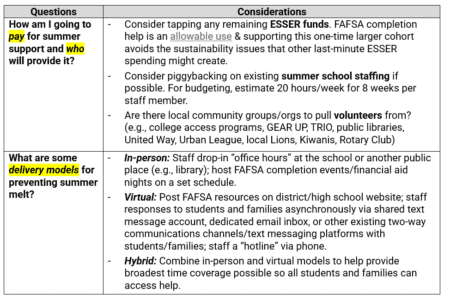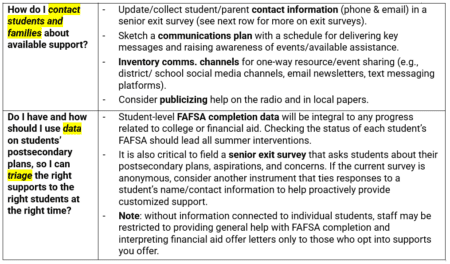Offer Summer Supports to Students to Drive FAFSA, Combat Melt
This summer, far more high schools must consider offering summer support to turn the tide on FAFSA completion and ensure we don’t see enrollment declines this fall.
By Bill DeBaun, Senior Director, and David Lanore, Program Manager, National College Attainment Network
Some, but not nearly enough, high schools offer summer melt prevention services to assist with the myriad tasks that can trip up a student and stymie the matriculation of college-intending students. This summer, far more high schools must consider offering summer support to turn the tide on FAFSA completion and ensure we don’t see enrollment declines this fall.
The high school class of 2024’s FAFSA completion rate is on-track to be down 10 percentage points compared to last year’s seniors. That’s an eye-popping figure and one that has K-12 and higher ed advocates, practitioners, and policymakers wringing their hands. Last June 30, 53.4% of the class of 2023 had completed a FAFSA. Through mid-April of this year, that figure is just 32.9%.
NCAN has always looked at the first June 30 of a FAFSA cycle as a key milestone. There’s nothing particularly special about June 30 in terms of deadlines or policy, it’s just the date, ten months into a normal cycle, six months into this year’s, where NCAN surmises that most students will not have regular access to advising services from their district or high school.
Every year, an estimated 10-40% of college-intending high school seniors don’t arrive on college campuses in the fall following high school graduation. This phenomenon, “summer melt,” disproportionately impacts first-generation college students and students from low-income backgrounds. This year, a broader “summer support” effort is warranted.
For districts and schools that don’t currently provide summer melt/support services, there are a few questions to ask and considerations to make:


NCAN has collected a variety of resources related to summer melt that will be valuable for any district or school’s planning efforts:
- NCAN’s Better FAFSA Resource Page: Includes information on current FAFSA challenges and workarounds, training for staff, awareness and outreach toolkits, FAQs, etc.
- US – “Freeze Summer Melt”: This guide offers details about summer melt prevention strategies, including concrete implications on staffing, budget, and evaluation.
- Award Letter Review: Students often need support comparing their college options. This NCAN guide is a resource for staff and other volunteers to assist with that critical but confusing comparison.
- College Transition Checklists: Students often matriculate to nearby institutions. College Transition Checklists like these provided by the Puget Sound College and Career Network are an excellent resource to produce for the top 3-5 (or more) institutions to which your students matriculate. Ask university admissions/financial aid contacts to assist with production.
- Strategic Data Project: Summer Melt Handbook: A comprehensive resource walking step-by-step through the timeline and strategies for preventing summer melt. Includes workflows, intervention options, and advice on identifying and collaborating with partner organizations.
- Strategic Data Project: Sample Initial Outreach Checklist for Counselors/Staff: This is a useful script for summer support staff to employ when considering and documenting students’ statuses and needs.
- Strategic Data Project: Sample Summer Checklist for Students: Handout for students highlights key milestones they may need to complete to matriculate.
- Student-Level FAFSA Data Sharing by State: Provides access to critical student-level FAFSA data.
There’s no doubt this is an urgent moment for the class of 2024, and the activities we propose are critical for keeping as many students on-track for postsecondary matriculation this fall as possible. More broadly, however, this is a good time to check or grow summer melt prevention activities for future classes, and the suggestions above are great for that, too.
NCAN stands ready to assist with questions about summer melt/support programming. Have questions? Email Alessandra Cipriani-Detres at alessandra@ncan.org and David LaNore at lanore@ncan.org.